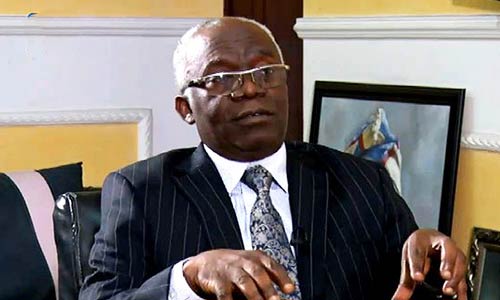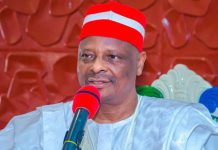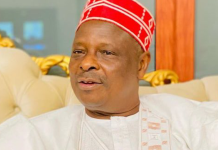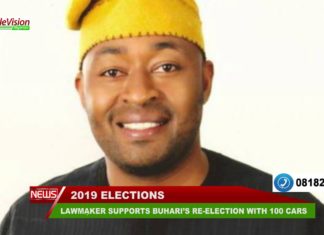Falana decried shrinking civil space in Nigeria, rising insecurity and poverty in the land. He regretted that while the country is drifting off course, the government of President Muhammadu Buhari is busy chasing shadows. Falana was speaking at the 13th Wole Soyinka Centre Media Lecture. Nigerian lawyer Femi Falana has urged Nigerians to continue to demand change through peaceful agitation. He recalled how he went to court in 2003 to defend President Buhari’s right to protest against the Obasanjo administration.
“Nobody can say that we cannot demonstrate,” he said. Nigeria’s Femi Falana has urged women to play a more active part in politics. She said the country’s colonial history, recorded stories of women like Funmilayo Ransom-Kuti who played key roles in the fight against colonial rule.
Buhari begged me to fight for his right to protest in 2003; today, he denies Nigerians the same right – Falana
Mr. Femi Falana (SAN), a human rights lawyer, has decried what he calls Nigeria’s dangerously shrinking civil space, as well as rising insecurity and poverty, stating that the country is in perilous times.
Falana, who was the chairperson of the 13th Wole Soyinka Centre Media Lecture held in Lagos on Tuesday to commemorate Nobel Laureate Professor Wole Soyinka’s 87th birthday, expressed regret that the government of President Muhammadu Buhari is busy chasing shadows while the country is drifting off course.
Falana questioned why, in the twenty-first century, the Buhari government is still looking for cattle routes when organic beef is already available.
“How can you be looking for grazing routes when you have organic beef in the twenty-first century?” He explained, “It’s animal husbandry.” “Take Botswana, a small country with a population of only two million people, but a cattle population of 2.5 million. That country has a market and everything for animal husbandry, so producing and distributing beef isn’t rocket science.”
Buhari is appointing Lauretta Onochie as INEC commissioner, despite the country’s serious security and economic problems and calls for electoral reforms, according to the rights activist.
“I believe we are living in perilous times,” he said. “However, we are still discussing Onochie and how to appoint her as an INEC commissioner.”
Falana stated that it was past time for serious-minded people to enter politics, as he believes that NGOs’ politics can no longer help the country when criminals are in charge of the legislature.
He noted that the world has moved on from oil to a knowledge economy, and that Nigeria can no longer afford to have people fixated on oil.
“No one has time for oil any longer. This is a knowledge-based economy. Today, we have a situation where countries with no natural resources are ahead of the pack, while those of us with plenty are poor.
“Our economy is based on people fleeing to Abuja to share their misery. What is the value of the money we earn from oil? Every year, we earn around $30 billion. In fact, oil brought in $15 billion last year. Nigeria’s budget was $30 billion last year, while Brazil’s was $650 billion. Nigeria has 206 million people, while Brazil has 214 million.”
Falana urged young Nigerians to continue their peaceful agitation for change, saying that no one can stop Nigerians from exercising their right to protest.
Recalling how he went to court in 2003 to defend President Buhari’s right to protest, he expressed his disappointment that people are now being manhandled and detained for protesting under Buhari’s administration.
Read also: BREAKING: APC denies suspending Rochas Okorocha
“No one can claim that we are unable to demonstrate. “We were demonstrating under the military; under the most repressive military regimes that we have had in the country,” he said. “In 2003, the Olusegun Obasanjo administration invaded a rally in Kano attended by General Buhari and the late Chuba Okadigbo – and this is painful. They sprayed tear gas, Okadigbo was asthmatic, and he died two days later after inhaling poisonous gas. They came to me – I’m talking about General Buhari – after that horrible experience, begging me to represent them in court because they didn’t have any money.
“The police stated that they did not have a permit to hold the rally; how can you hold a rally without a permit?” I represented them in court, and the decision was handed down in November 2006. In Nigeria, the court ruled that police permits for rallies are illegal and unconstitutional. The police took their case to the court of appeal, which ruled in 2008 that “police permits are a relic of colonialism, and that a free people do not require permits to enjoy their freedom.”
“We mobilized the national assembly – a more serious national assembly than the one we have now – and they passed a law in 2016 stating that if you are planning a rally in Nigeria, all you have to do is notify the police, and the police will provide adequate security.
“Section 83 subsection 4 of the 2020 Police Act reiterated this, stating that the police have a duty to protect you during protests so that the hoodlums created by the government do not disrupt your rally. Yes, the government is responsible for the hoodlums who disrupt rallies. During peacetime, the young men who have nothing to do are referred to as area boys. During elections, they are referred to as thugs. When they are mobilized to disrupt protests, however, they are referred to as hoodlums.”
Falana urged Nigerian women to become more involved in politics, pointing out that the country’s colonial history contains accounts of women like Funmilayo Ransom-Kuti who were instrumental in the fight against colonialism.
Join Television Nigerian Whatsapp Now
Join Television Nigerian Facebook Now
Join Television Nigerian Twitter Now
Join Television Nigerian YouTUbe Now





